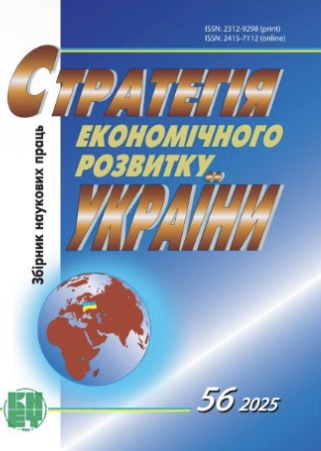ЦИФРОВА ТРАНСФОРМАЦІЯ ВИЩОЇ ОСВІТИ: ЕТИЧНІ ВИКЛИКИ ТА РОЛЬ У ПІДГОТОВЦІ ЛІДЕРІВ ЗМІН
DOI:
https://doi.org/10.33111/sedu.2025.56.232.247Ключові слова:
цифрова трансформація, вища освіта, цифрова доброчесність, штучний інтелект, етичні виклики, лідерство, цифрові компетентності, smart-економікаАнотація
У статті проаналізовано етичні виклики цифрової трансформації вищої освіти в умовах стрімкого впровадження штучного інтелекту. Об’єктом дослідження є система вищої освіти, предметом — етичні аспекти цифровізації. Метою є визначення стратегічної ролі вищої освіти у формуванні культури цифрової доброчесності та підготовці лідерів змін. Застосовано методи контент-аналізу, анкетування, порівняльного аналізу міжнародного досвіду. Встановлено необхідність переходу від адміністративного контролю до інституціалізації цифрової етики. Наведено приклади ефективних ініціатив із підвищення цифрової компетентності викладачів.
Посилання
Gkrimpizi, Thomais, Vassilios Peristeras, and Ioannis Magnisalis. 2023. “Classifi-cation of Barriers to Digital Transformation in Higher Education Institutions: Systemat-ic Literature Review.” Education Sciences 13, no. 7: 746. https://doi.org/10.3390/educsci13070746
Benavides, Lina María Castro, Johnny Alexander Tamayo Arias, Martín Darío Arango Serna, John William Branch Bedoya, and Daniel Burgos. 2020. “Digital Trans-formation in Higher Education Institutions: A Systematic Literature Review.” Sensors 20, no. 11: 3291. https://doi.org/10.3390/s20113291
Porayska-Pomsta, Kaska, Wayne Holmes, and Selena Nemorin. 2024. “The Ethics of AI in Education.” arXiv preprint arXiv:2406.11842. https://arxiv.org/abs/2406.11842
Coghlan, Simon, Tim Miller, and Jeannie Paterson. 2020. “Good Proctor or ‘Big Brother’? AI Ethics and Online Exam Supervision Technologies.” arXiv preprint arXiv:2011.07647. https://arxiv.org/abs/2011.07647
Musaigwa, Misheck, and Vivence Kalitanyi. 2024. “Effective Leadership in the Digital Era: An Exploration of Change Management.” Technology Audit and Production Reserves 1(4(75)): 6–14. https://doi.org/10.15587/2706-5448.2024.297374
Onan, Gökhan. 2024. “Digital Transformation and Digital Leadership in Higher Education Institutions: Insights from the Literature.” International Journal of New Ap-proaches in Social Studies 8, no. 2: 198–213. https://doi.org/10.38015/sbyy.1587587
Grosz, Barbara J., David Gray Grant, Kate Vredenburgh, Jeff Behrends, Lily Hu, Alison Simmons, and Jim Waldo. 2018. Embedded EthiCS: Integrating Ethics Broadly Across Computer Science Education. Harvard University. https://doi.org/10.48550/arXiv.1808.05686
Hrebeshkova, Olena. 2022. “SMART Technologies in the Design of Emotionally Intelligent Online Courses (on the Example of Microsoft Teams).” Strategy of Economic Development of Ukraine, no. 51: 164–175. https://doi.org/10.33111/sedu.2022.51.164.175 [in Ukrainian]
Kyzenko, Olena, Olena Hrebeshkova, Iryna Kubarieva, Vitalii Pazdrii, Veronika Verba, Dmytro Lifintsev, and Anna Hurenko. 2021. “Formation of an Educational Pro-gram Ecosystem Based on Social Network Technology.” Strategy of Economic Develop-ment of Ukraine, no. 49: 138–155. https://doi.org/10.33111/sedu.2021.49.138.155 [in Ukrainian]
Hrebeshkova, Olena M., and Olena O. Kyzenko. 2019. “Potential of Educational Innovations in Forming Digital Competence of Entrepreneurs in Ukraine.” In Innovative Entrepreneurship: Approach to Facing Relevant Socio-Humanitarian and Technological Challenges, edited by I. M. Riepina et al., 160–178. Lviv–Toruń: Liha-Pres. https://doi.org/10.36059/978-966-397-163-6/160-178
UNESCO. Recommendation on the Ethics of Artificial Intelligence. Paris: United Nations Educational, Scientific and Cultural Organization, 2021. https://unesdoc.unesco.org/ark:/48223/pf0000381137
Hrebeshkova, Olena M., and Olena O. Kyzenko. Questionnaire for the Study on the Use of Artificial Intelligence in Higher Education: Certificate of Copyright Registration No. 133504 dated February 18, 2025. [in Ukrainian]
Welding, Lyss. “BestColleges Survey – Half of College Students Say Using AI Is Cheating or Plagiarism.” March 2023. https://www.bestcolleges.com/research/college-students-ai-tools-survey/
Nam, Jane. “56% of College Students Have Used AI on Assignments or Exams.” November 22, 2023. https://www.bestcolleges.com/research/most-college-students-have-used-ai-survey/
Freeman, Josh. “HEPI – Student Generative AI Survey 2025.” February 2025. https://www.hepi.ac.uk/2025/02/26/student-generative-ai-survey-2025
Kelly, Rhea. “Survey: 86% of Students Already Use AI in Their Studies.” 2024. https://campustechnology.com/articles/2024/08/28/survey-86-of-students-already-use-ai-in-their-studies.aspx
Prothero, Arianna. “New Data Reveal How Many Students Are Using AI to Cheat.” April 2024. https://www.edweek.org/technology/new-data-reveal-how-many-students-are-using-ai-to-cheat/2024/04
High-Level Expert Group on Artificial Intelligence. Ethics Guidelines for Trustworthy AI. Brussels: European Commission, 2019. https://digital-strategy.ec.europa.eu/en/library/ethics-guidelines-trustworthy-ai
Ministry of Digital Transformation of Ukraine, Ministry of Education and Science of Ukraine. Recommendations for the Responsible Implementation and Use of Artificial Intelligence in Higher Education Institutions. Kyiv, 2025. https://thedigital.gov.ua/storage/uploads/files/page/communi-ty/docs/Vykorystannya_AI_u_vyshchyy_osviti.pdf [in Ukrainian]
Hrebeshkova, Olena, and Olena Mykhailenko-Blayon. “Transformational Challenges of E-learning at the Vadym Hetman Kyiv National Economic University, Ukraine.” In Transformative Digital Learning: Emerging Cases and Considerations, 73–81. Rēzekne, Latvia: RTU Rēzeknes akadēmija, 2021. https://books.rta.lv/index.php/RTA/catalog/book/23
Nolan, Beatrice. 2023. Here Are the Schools and Colleges That Have Banned the Use of ChatGPT over Plagiarism and Misinformation Fears. January. https://www.businessinsider.com/chatgpt-schools-colleges-ban-plagiarism-misinformation-education-2023-1
Shiri, Ali. 2023. “ChatGPT and Academic Integrity.” Information Matters 3 (2). https://informationmatters.org/2023/02/chatgpt-and-academic-integrity/
Shaw, Charles, Li Yuan, David Brennan, Sarah Martin, Noah Janson, Katie Fox, and George Bryant. 2023. GenAI in Higher Education. Fall 2023 Update. Time for Class Study. October 23. Tyton Partners. https://tytonpartners.com/app/uploads/2023/10/GenAI-IN-HIGHER-EDUCATION-FALL-2023-UPDATE-TIME-FOR-CLASS-STUDY.pdf
Pasichnyi, Roman, Viacheslav Serhieiev, Sergii Shevchenko, Nina Petrukha, and Bohdan Hryvnak. 2024. “Digital Transformation of Higher Education as a Driver of Ukraine’s Integration into the European Educational Space.” Cadernos De Educação Tecnologia E Sociedade 17 (se4): 232–245. https://doi.org/10.14571/brajets.v17.nse4.232-245
Russell Group. 2023. Principles on the Use of Generative AI Tools in Education. July 3. https://www.russellgroup.ac.uk/policy/policy-briefings/principles-use-generative-ai-tools-education
##submission.downloads##
Опубліковано
Як цитувати
Номер
Розділ
Ліцензія

Ця робота ліцензується відповідно до Creative Commons Attribution-NonCommercial-NoDerivatives 4.0 International License.


